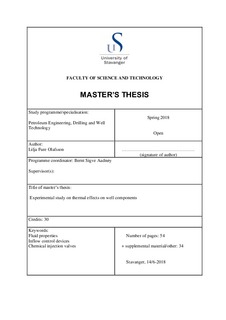| dc.contributor.advisor | Aadnøy, Bernt Sigve | |
| dc.contributor.author | Olafsson, Lilja Fure | |
| dc.date.accessioned | 2018-10-18T12:50:42Z | |
| dc.date.available | 2018-10-18T12:50:42Z | |
| dc.date.issued | 2018-06 | |
| dc.identifier.uri | http://hdl.handle.net/11250/2568684 | |
| dc.description | Master's thesis in Petroleum engineering | nb_NO |
| dc.description.abstract | The main objective of inflow control devices is to maintain a uniform inflow by providing an additional pressure loss between the formation and the wellbore. ICDs delay the production of water or gas, and thus increase the reservoir fluid recovery.
The development of challenging oil and gas fields has created an increased demand for chemical injection. Chemical injection enhance production and increase recovery. Some of the purposes of chemical injection is to enhance flow characteristics and quality of oil and gas before transportation, prevent hydrate formation, and prevent deposition of scale, paraffin and asphaltenes.
During chemical injection with conventional valves changes in pressure or temperature results in an inaccurate flow rate. For inflow control devices, coning is delayed but once water or gas breakthrough, production is taken over by the breakthrough fluid. ICDs are thus not an optimal solution when the inflow conditions change as the well matures since they are not adjustable or retrievable.
Autonomous valves account for changes in pressure and temperature. It is achieved by creating a constant pressure differential across a regulation. AICDs restrict inflow of unwanted fluids also after breakthrough by creating a higher-pressure differential.
The aim for the thesis was to examine how the set flowrate on the autonomous chemical injection valves SkoFlo and FloWizard was affected by changes in temperature when injecting water. It can also be implemented for autonomous inflow control devices (AICD) where the valve function is equal. The conclusion from the experiments is that change in temperature causes an insignificant change in flowrate. | nb_NO |
| dc.language.iso | eng | nb_NO |
| dc.relation.ispartofseries | Masteroppgave/UIS-TN-IEP/2018; | |
| dc.rights | Navngivelse 4.0 Internasjonal | * |
| dc.rights.uri | http://creativecommons.org/licenses/by/4.0/deed.no | * |
| dc.subject | petroleumsteknologi | nb_NO |
| dc.subject | petroleum engineering | nb_NO |
| dc.subject | boreteknologi | nb_NO |
| dc.subject | brønnteknologi | nb_NO |
| dc.subject | fluid properties | nb_NO |
| dc.title | Experimental study on thermal effects on well components | nb_NO |
| dc.type | Master thesis | nb_NO |
| dc.subject.nsi | VDP::Teknologi: 500::Berg‑ og petroleumsfag: 510::Petroleumsteknologi: 512 | nb_NO |

